In a poll released on Wednesday, Gallup found that 42% of Americans believe homosexual people are born homosexuals, rather than becoming so due to factors such as upbringing and environment. 37% voiced the opposite opinion, and another 21% didn’t answer. Nobody asked me, but if they had, I’d have responded with some questions of my own: why are those the only options? How come you’re asking random strangers of unknown sexual orientation rather than actual queer people? And don’t you think that’s kind of a loaded question?
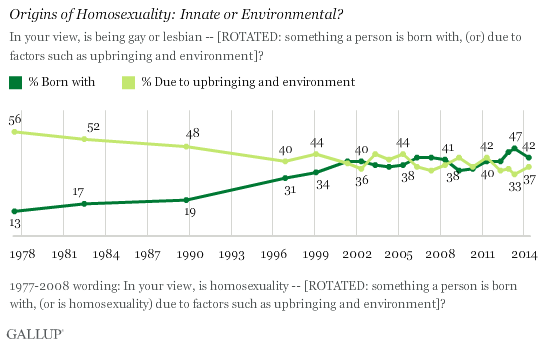
Gallup has a long history of polling the general public about queer issues, sometimes problematically. In the case of this particular question, it fits into the larger narrative being told by a particularly vocal set of gay rights activists. That narrative goes something like this: gay rights are the civil rights struggle of our time. As we know, it’s wrong to discriminate on the basis of race, because people are born that way. Similarly, it’s wrong to discriminate on the basis of sexual orientation, because people are born that way.
Those are far from the worst ideas I’ve ever heard; I think there are elements of truth in all of those things. But those are far from the only true things, and sometimes the repetitive drum of the “born this way” tagline drowns out those other truths.
Yes, some people are queer and know it from a very young age. Other people realize their queerness a little later on — in college, or after they’ve married a partner of a different sex. Some people experience fluid sexual attraction throughout their lives. Still others (count me in this group) feel like their queerness is something they chose for themselves — and further, that the element of choice in their behavior and identity should have nothing to do with its acceptability.
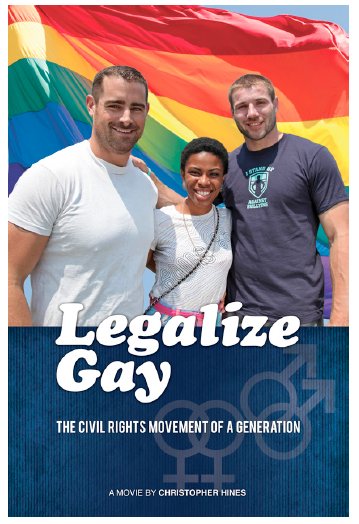
I think that part of the reason many of us have become invested in the idea of inherent queerness is that it’s an easy narrative to defend. People generally understand why discrimination against minority groups is wrong, thanks to the hard work put in by black civil rights activists (and women’s rights groups after them, and immigrant groups, etc). By slotting queer people into this familiar framework, our struggles become quickly comprehensible.
However, the queer-rights-as-civil-rights approach has its limitations. Getting hate crime legislation passed, for example, is no small feat; however, it still leaves the underlying hate intact. I also question whether the idea of queer people as just the same as you straight people except for this one thing is applicable — because we aren’t exactly the same, are we? The very nature of our difference means that certain foundational social structures from straight society (I’m thinking gender roles and the like) cannot operate in the same way. Queer culture has some unique features, and I think we’d be better off trying to make straight society more like us than the other way around.
Beyond that, I feel like it’s hypocritical to piggyback on the work of civil rights leaders without examining racism in queer culture. If the goal of civil rights activism is to eliminate discrimination in all forms, why aren’t more queer groups taking steps to explicitly fight racism? Why are there so many entitled white queer people oblivious to their privilege? The struggle against racism isn’t “over,” and there are many racialized people who are also queer. I feel 100% confident saying that I was born as a mixed race Filipina due to factors beyond my control. My queer status? Less so. I suppose it’s possible that I was “born” bisexual, but again, that isn’t what feels true to me. What feels true is that I’ve made a series of choices and that I continue to do so.
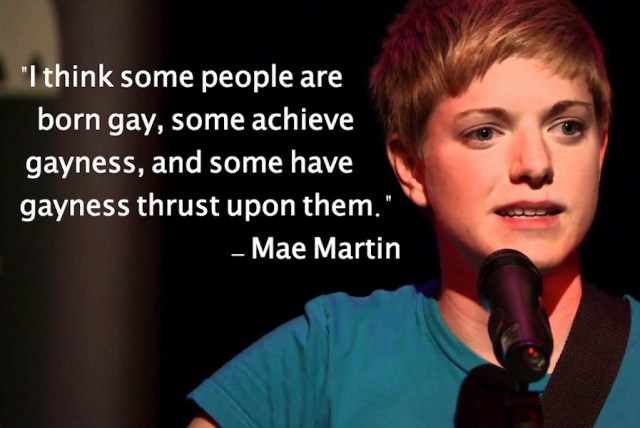
While scientists continue to explore the many ways that biology relates to/is responsible for our sexual identities, anecdotally, I can think of plenty of instances in which I’ve made conscious decisions regarding the matter. In Virtual Equality: The Mainstreaming of Gay & Lesbian Liberation, Urvashi Vaid writes, “Homosexuality always involves choice — indeed, it involves a series of four major choices: admitting, acting, telling, and living. Even if scientists prove that sexual orientation is biologically or genetically determined, every person who feels homosexual desire encounters these four choices.” Maybe this isn’t everyone’s truth, but what Vaid describes feels true for me. Perhaps more importantly, I agree with her that the argument for innate queerness is very politically limiting.
Vaid explains, “Where we once sought to free the homosexual potential in everyone, by making it safer to be gay, lesbian, or bisexual, we now assert the conservative view that all we want is the freedom to be our biologically determined selves. History shows that the shelter of biology has never protected a people from persecution. The right does not care that we were born gay; they object to us because we are not straight.”
Although Vaid wrote all of this in the mid ’90s, the point still stands. While not all queer people have the luxury of a safe environment to come out in, what if those of us who could moved away from biological essentialism, and instead focused on stamping out homophobia? What if our larger cultural narrative was less like “People can’t help being the way they are so give them a break” and more like “Every person deserves respect, regardless of who they are or how they got that way“? Like, maybe I wouldn’t emblazon that across the back of a jean jacket (or maybe I would!), but it feels to me like a more empowering message.
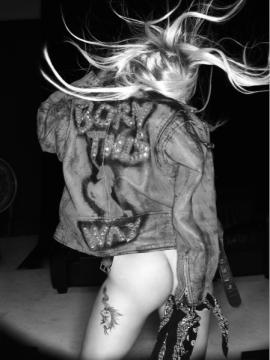
Even though the person who brought “born this way” into pop culture parlance is an out bisexual, some disturbingly common threads I see throughout these “born or made” discussions are monosexism and bisexual erasure. For example, I don’t think it’s accidental that Gallup only directly named gays and lesbians in their poll. By and large, bisexuals are seen as a complication, or watered down extensions of “authentic” sexualities, where authenticity is connected to biological fact.
In Bi: Notes for a Bisexual Revolution, Shiri Eisner writes, “In the case of bisexuality, we might look at society’s insistent attempts to naturalize both homosexuality and heterosexuality, appealing to bodies, genes, hormones, and brains in order to establish that ‘this’ (the sexuality in question) is inborn, natural, and immutable. Under this logic, one is either ‘born’ gay or ‘born’ straight, and thus any performance of their desires is ‘true to its nature.’ Being in a same-gender relationship presumes homosexuality, and being in a different-gender relationship presumes heterosexuality because one’s relationship choices are understood to reflect one’s inner essence. Bisexuality — and bisexual passing — short-circuits this circular logic by showing that ‘acting gay’ or ‘acting straight’ does not necessarily equate with ‘being gay’ or ‘being straight.’ It allows us to distrust visual representations and to deconstruct claims of inner essences.”
I think part of the reason why we like to think of sexual orientation as a division between two camps is that when differences are well-defined, they are easily contained. Polarized notions of gender and sexuality make it easy for people to figure out which side they’re on and draw lines between “us” and “them.” Bisexuality breaks this worldview down, showing people that the “other side” is not so different. And while prejudiced people can learn to be “okay with” homosexuality as long as they maintain distance from it, it’s a different and trickier thing to feel “okay with” ambiguity that hits so close to one’s own sense of self.
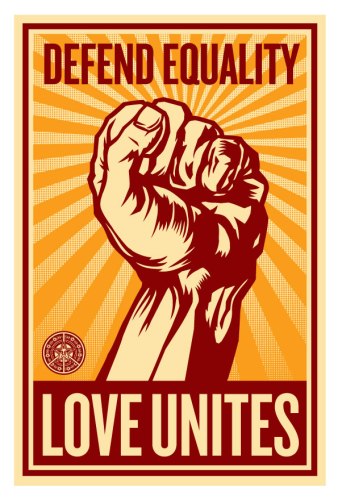
In the end, my feeling is this: it doesn’t matter how we got here. Whether we were born this way or we chose to be queer, we’re all entitled to be who we are, period. We don’t owe anyone an explanation or poll results playing into a narrow definition of “progress.” All we owe each other is respect.
In order to make sure that the comments section on this article is a healthy and welcoming place for our bisexual readers, please note that any comments that question the validity of bisexuality or sexual fluidity as a sexual orientation, question Autostraddle’s decision to publish pieces discussing bisexuality, or make essentialist claims about bisexual people (ex. bisexuals are cheaters, bisexuals turn out to be gay) will be swiftly deleted.

